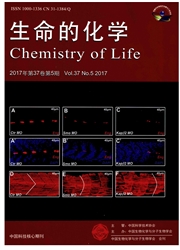

 中文摘要:
中文摘要:
蛋白质翻译后修饰是实现蛋白质多样化功能的一种重要的调控方式,泛素化和SUMO化作为重要的蛋白质翻译后修饰在转录调节、染色质结构及基因组稳定性维持以及DNA修复中扮演重要角色。由于泛素(ubiquitin,Ub)、小泛素相关修饰物(small ubiquitin-related modifier,SUMO)都是修饰目标蛋白质上的赖氨酸,因此在通常情况下,二者对于同一个蛋白质的翻译后修饰存在拮抗或协同作用,但具体调控机理目前研究还不多。DNA损伤与肿瘤的发生发展密切相关。DNA损伤若未能得到及时修复或者修复过程中出现异常,将会导致肿瘤的发生,甚至会产生致死型突变。近年来,对于DNA损伤修复过程中涉及到的蛋白质翻译后修饰的研究已成为研究热点。本文旨在阐明泛素化、SUMO化对DNA损伤修复过程中关键因子的调控作用,为了解多种翻译后修饰对DNA修复过程的调控提供新视角。
 英文摘要:
英文摘要:
Protein post-translational modification plays an important role in understanding the diversity of protein functions. As important post-translational modifiers, ubiquitin(Ub) and the small ubiquitin-related modifier(SUMO) posttranslationally modifies many proteins playing roles in various processes including the regulation of transcription, the maintenance of chromatin structure and genome stability, and DNA reparation. As both ubiquitin and SUMO modify target proteins at their lysine sites, there may be antagonistic or synergistical effects on the same protein, although little about its mechanism is known. DNA damage relates closely with tumorgenesis. If DNA damage cannot be repaired timely, or anything aberrant occurs during the DNA damage repairing, it could be carcinogenic, even producing lethal mutants. posttranslational modifications of proteins involved in DNA damage repairing have recently become a hot issue. This review focuses mainly on the roles of ubiquitylation and sumoylation of key factors in DNA damage response, providing a new insight into these modifications in response to DNA damage.
 同期刊论文项目
同期刊论文项目
 同项目期刊论文
同项目期刊论文
 PTEN suppresses the oncogenic function of AIB1 through decreasing its protein stability via mechanis
PTEN suppresses the oncogenic function of AIB1 through decreasing its protein stability via mechanis FOXK2 Transcription Factor Suppresses ER alpha-positive Breast Cancer Cell Growth Through Down-Regul
FOXK2 Transcription Factor Suppresses ER alpha-positive Breast Cancer Cell Growth Through Down-Regul EGF is required for cardiac differentiation of P19CL6 cells through interaction with GATA-4 in a tim
EGF is required for cardiac differentiation of P19CL6 cells through interaction with GATA-4 in a tim Induction of the CLOCK gene by E2-ERalpha signaling promotes the proliferation of breast cancer cell
Induction of the CLOCK gene by E2-ERalpha signaling promotes the proliferation of breast cancer cell DEC1 regulates breast cancer cell proliferation by stabilizing cyclin E protein and delays the progr
DEC1 regulates breast cancer cell proliferation by stabilizing cyclin E protein and delays the progr Switching of the Triplet Excited State of Rhodamine/Naphthaleneimide Dyads: An Experimental and Theo
Switching of the Triplet Excited State of Rhodamine/Naphthaleneimide Dyads: An Experimental and Theo The relationship between the inflammatory response and cell adhesion on alginate-chitosan-alginate m
The relationship between the inflammatory response and cell adhesion on alginate-chitosan-alginate m Contributory role of five common polymorphisms of RAGE and APE1 genes in lung cancer among Han Chine
Contributory role of five common polymorphisms of RAGE and APE1 genes in lung cancer among Han Chine DACH1 inhibits SNAI1-mediated epithelial-mesenchymal transition and represses breast carcinoma metas
DACH1 inhibits SNAI1-mediated epithelial-mesenchymal transition and represses breast carcinoma metas 期刊信息
期刊信息
